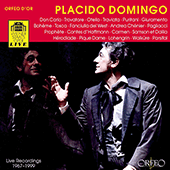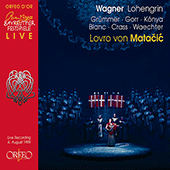Rita Gorr
Rita Gorr (originally Marguerite Geimaert) initially studied singing in Ghent before moving to the Brussels Conservatoire where she was a pupil of Vina Bovy, Jeanne Pacquot d’Assy and Germaine Hoerner. Having won first prize in the Verviers Competition of 1946, she made her operatic stage debut as Fricka / Die Walküre at Antwerp in 1949 and from then until 1952 was based at the Strasbourg Opera, where she enjoyed success as Gluck’s Orpheus, Carmen and Amneris / Aida. She also sang Ursula in the 1951 French premiere of Hindemith’s opera Mathis der Maler.
In 1952 Gorr won first prize in the Lausanne International Singing Competition, making her debuts at both the Opera and Opéra-Comique in Paris the same year. Her roles in Paris included Dalila / Samson et Dalila, Brangäne / Tristan und Isolde, Venus / Tannhäuser, Magdalene / Die Meistersinger von Nürnberg, Charlotte / Werther, Geneviève / Pelléas et Mélisande and Mère Marie / Dialogues des Carmélites. Gorr first appeared at the Bayreuth Festival in 1958 as Fricka / Das Rheingold, followed by Fricka / Die Walküre and the Third Norn / Götterdämmerung; and was a notable Ortrud in Wieland Wagner’s 1959 production of Lohengrin. Her debut at La Scala, Milan was also in 1958, as Santuzza / Cavalleria rusticana; in 1960 she returned as Kundry / Parsifal.
At the Royal Opera House, London Gorr first sang in 1959 as Amneris. She returned to Covent Garden frequently, as Iphigénie / Iphigénie en Tauride, Fricka / Die Walküre, Eboli / Don Carlo, Ortrud, Azucena and Ulrica / Un ballo in maschera. She also sang in the English premiere of Roussel’s opera Padmâvatî, presented in 1969 at the London Coliseum. It was with Amneris that she also made her debut at the Metropolitan Opera, New York in 1962. Gorr sang with the Met for four seasons; her roles included Azucena, Dalila, Eboli and Santuzza. Other opera houses where she appeared during the 1960s and 1970s included Brussels, Ghent, Florence, Lisbon, Monte Carlo, Naples and Vienna; and in North America Chicago, Dallas and Philadelphia.
During and after the 1980s Gorr went on to enjoy what was effectively a second career in character parts such as the Mother / Louise (Brussels), Kabanicha / Kát’a Kabanová, Herodias / Salome (Lyons), Mme de Croissy / Dialogues des Carmélites (Berlin, Essen, Lyons, Seattle), Marthe / Faust (Nantes), Filipyevna / Eugene Onegin (Opéra Bastille and Barcelona) and the Countess / The Queen of Spades (Amsterdam and Vienna, 1999). This last was the role in which she made her 2007 farewell appearances in Ghent and Antwerp.
Equally at home in the French, Italian and German repertoires, Gorr was a commanding presence on stage, possessing great dramatic skill. Her large voice, with its extensive range, was always used with acute musicianship musicianship; and she had the rare ability to generate great intensity of emotion through her unique vocal character. Gorr recorded extensively: her studio recordings of Ortrud with Leinsdorf and Amneris with Solti are particularly notable.
© Naxos Rights International Ltd. — David Patmore (A–Z of Singers, Naxos 8.558097-100).


















